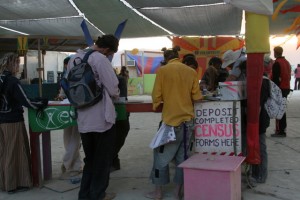One of the enduring myths of American society is “rugged individualism” which suggests that through sheer effort, any individual can surmount any challenge. Hard work is necessary, but it often isn’t enough, especially when years of emphasizing short-term corporate profitability and “small” government have eroded good jobs and decent health and retirement benefits for many people. Decades ago, sociologist Katherine Newman documented the effects of lay-offs on professionals and their families in Falling from Grace: Downward Mobility in the Age of Affluence. People suffered alone. When people believe that their circumstance are unique to them rather than widely shared with others, they may make few or no demands for larger societal change.
As Occupy Wall Street and its affiliates demonstrate, some are beginning to realize the power of collective organizing. Like Burning Man participants, some OWS participants are learning decision-making by consensus and other skills; others are applying skills, knowledge, and experiences learned elsewhere to build a collective that more thoroughly reflects their interests.
For the corporate media, the government, and individuals, OWS is difficult to comprehend because it encompasses people whose circumstances such as joblessness are seen as individual failings, rather than the result of larger societal processes. Moreover, OWS does not conform to how organizations or social movements are expected to act. People expect collectives to have one leader who make decisions topdown through a hierarchy; furthermore, people expect collectives to state just a few easily articulated goals (i.e., make a profit) and set ways of pursuing these goals. In contrast, OWS has no single spokesperson or leader and instead relies upon collective input, and it advocates multiple goals, including an emphasis on individual and collective expression. These characteristics are unnervingly different for those who are used to conventional bureaucratic rationality.
In reality, many organizations and indeed, our society, operate more like OWS than most would like to think. We have many interests and goals; it’s often hard work to reconcile how to best pursue these goals, including how to organize. Sometimes, we have to try different things before realizing our preferences. Organizing is messy, hard work – organizations do not run by themselves like machine clockwork, they require the constant cooperation of people to regularly carry out organizing activities. However, organizing offers rewards to those who enjoy working collectively and want to coordinate efforts towards complex goals.

